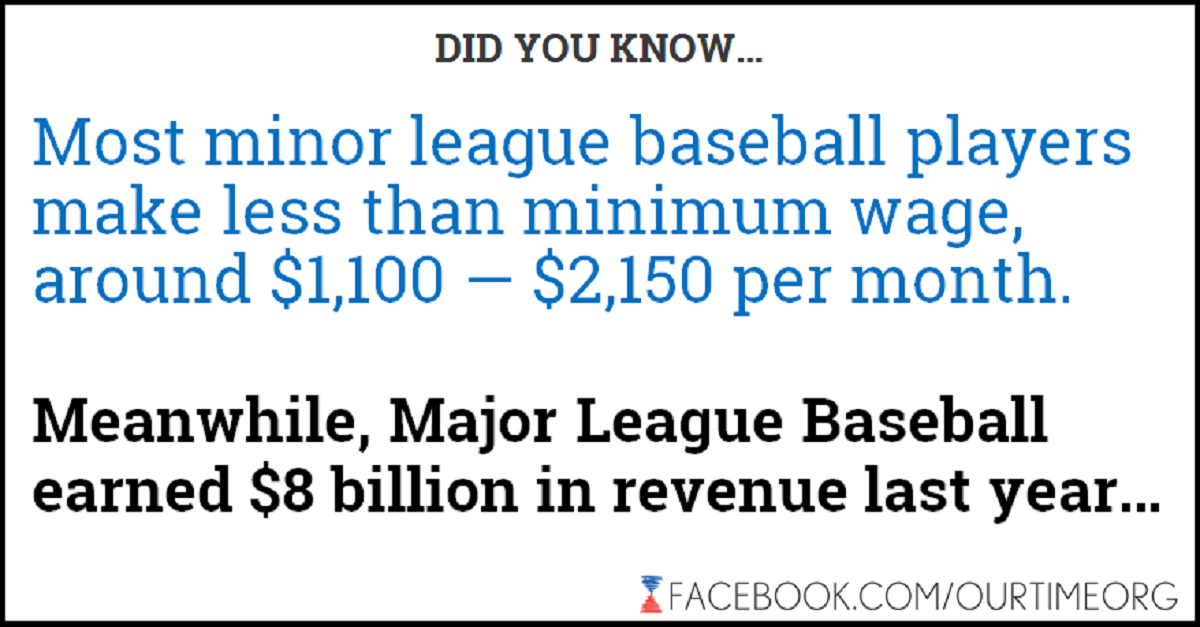Think Fast Food Workers are Underpaid? Minor League Baseball Players Make Half!
By:
When we reflect on income inequality in America, our frame of reference is generally Wall Street vs. Main Street: fat cat bankers vs. toiling autoworkers, Fortune 500 CEOs vs. janitors who clean their offices at night. But a quieter parable for America's wealth division is the story of professional major league athletes vs. their minor league counterparts. According to Sports Illustrated, most minor league ballplayers earn less than half as much money as fast-food workers, approximately $1,100-- $2,150 per month. The minor leagues can perpetuate this because the institution is not classified as a typical corporation; it's technically exempt from antitrust laws and according to a near century-year-old Supreme Court ruling, baseball is a matter of "amusement not commerce."
Minor league ball players also forego public sympathy because, unlike many hard-pressed low income workers who reluctantly take whatever menial job they can find, they still choose their profession (presumably following their dreams of becoming a major league pro, where the salaries are abundant and the perks run aplenty). But the odds of making it to the big leagues are hardly rosy. In fact, only three percent of minor league players ever make it. Additionally, minor leaguers are subject to arduous workplace conditions and wage theft given the need to participate in rigorous daily exercise programs as well as report to spring training regimens without pay. The demanding and unpredictable schedule of a minor league player precludes many from holding a second job except during the off-season (minor league players also don't earn a penny from the league during the off-season while needing to maintain their skills and physical conditioning). Compounding the problem, players are frequently transferred between teams, meaning the job search starts all over in unfamiliar territory next off-season. It's gotten so bad that when you type "Can minor league baseball players" into Google, the search engine auto-predicts the rest of your search with "collect unemployment." (In case you're wondering, many can collect unemployment during the off-season.)

As a result, a few tenacious former minor league players have recently sued Major League Baseball, claiming their poverty wages violate federal minimum wage laws. The case is pending.
These ball players are part of a growing trend that includes college athletes, professional cheerleaders, Hollywood interns, and entry-level jobs in fashion and media: highly-profitable businesses reaping the benefit of underpaying workers in "coveted" positions.
On the auspicious side of the narrative are the one percenters -- baseball's top athletes like Ryan Howard, Cliff Lee, and Albert Pujols (all of whom make more than $20 million per year), and the league itself, who according to Forbes, raked in more than 8 billion dollars in 2013. One might think that with this kind of revenue, the league might be able to allocate a few extra dollars to their minor league employees. But this would also beg the question of why fast-food CEOs make 721 times more than their average worker and don't spread the wealth either. As Garrett Broshius, an ex-minor league ball player, said of his former colleagues: “we shouldn't allow Major League Baseball to take advantage of these guys just because they’re chasing a dream.”

